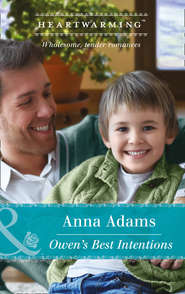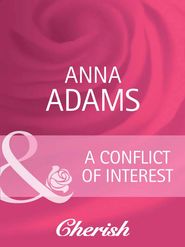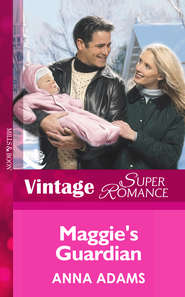По всем вопросам обращайтесь на: info@litportal.ru
(©) 2003-2025.
✖
The Prodigal Cousin
Автор
Год написания книги
2019
Настройки чтения
Размер шрифта
Высота строк
Поля
None of her cousins were obliged to their parents for love. None of her cousins hungered for a child and someone—a lover or husband—to call her own.
“Have some wine for me.” Sophie, still nursing Chloe, pushed a glass into Molly’s hand.
Molly fastened a smile on her face. “Thanks. Chloe’s lovely in the dress.” Made of white lawn, lacy and yellowed with age, it had been Calvert christening attire even before their grandparents had been thought of.
“You’re falling behind,” Sophie teased. Molly thought she meant everyone else was putting away the commemorative vino. “You’d better have a baby of your own before one of our kids kicks a hole in the family gown.”
A swallow of wine and a harsh breath bit the back of Molly’s throat at the same time, choking her. Only her parents knew about her miscarriage and its resulting effects. Full of shame, she’d hidden the truth from the rest of the family and she’d made her mom and dad promise never to tell.
She glanced at Sophie, who waited with a sweet smile, wanting only to share her happiness. Molly harnessed her shaky resources and pretended nothing was wrong.
“Can you imagine Grandpa in the gown?” She nudged her cousin, pointing as Seth Calvert once again led his wife, Greta, onto the small dance floor.
Sophie grinned. “They were just waiting for someone to put Glenn Miller back on. And no, I can’t picture tall, white-haired Grandpa in that fragile gown—or his father before him.” She leaned closer. “You feel left out today?”
Molly blinked back disgraceful tears, wishing she were a better actress. “It shows?”
“Maybe I’m a little more sensitive since I almost gave up Ian to do motherhood my way.” Sophie rested her gaze on Molly’s latest cousin-by-marriage, a relationship as strong as blood in the Tennessee mountains. “The right guy will show up, Molly. Maybe you already know him.”
“I’m not looking for a guy.” Unconsciously, she raised her voice enough to draw curious attention from Aunt Beth.
Sophie touched her arm. “There’s no shame. You’ve finished college. You have a good job. You wouldn’t be a Calvert if your mind didn’t turn to multiplying.”
Fine for an OB-GYN to say, but Molly clenched her teeth, forcing herself to keep smiling. Just in time, Ian beckoned Sophie to consult on the state of their daughter’s diaper. Expelling a held breath, Molly set her glass on the nearest table and made for the doorway.
In the foyer, she negotiated a path through the after-work golfers who were sending impatient glances toward the Calverts hogging the dining room for their party. Molly answered the reluctant hellos the guys offered. Half of them had kids in her class.
As she fought a gust of wind to force open the door, she felt as if she were breaking through the delicate barriers of a bubble. She sucked crisp, early October air into her lungs.
“Molly? Honey, what’s wrong?”
She spun. “Mom?” Her mother faced her from the club’s doorway. “I thought I saw you in line to hold Chloe.”
“Until you ran for your life.” Eliza Calvert, a perfect lady in palest pink chiffon, floated across the redbrick porch. “You aren’t—” She stopped, ambivalent about broaching a subject they both considered put to bed. “It’s not a panic attack?”
Molly still had them, but she’d learned to control them until she could reach privacy. “Nope. It was hot in there.”
“Not that you’re twenty-five? The youngest of your generation—the last to remain unmarried?” Her mother reached for her hands. Molly couldn’t step back, didn’t know how to reject her mother in any way. “You don’t have to hurry for the sake of the family.”
Usually, Molly chose to appreciate the happiness life and her parents had given her. Ashamed of wanting more when she had so much, she tried to make light of her mom’s concern. “I’m not man-hunting. I’m fine—I just couldn’t breathe in the heat.” She shivered in the cool breeze, betrayed by her own body.
Her mother held her tighter. “I was twenty-nine when I married your father. You have so much time.”
Molly saw no point in arguing. Once her mom got the bit between her teeth, she didn’t stop for miles.
“You know lots of young men, and I wish you wouldn’t hold back because of…”
“I am reluctant with men because I can’t have children. I don’t know when to talk about it. But maybe I hold back because no one’s made me want to get that close.”
“You don’t give anyone a chance. You stop seeing them after two weeks, maximum.”
Because no man waited longer than two weeks for sex these days, but she wasn’t about to enlighten her mom.
Eliza turned toward the highly polished doors. “Why don’t we go home?” Her hair fanned around her head. “I’ll find your dad, and we’ll make dinner out of whatever’s in the fridge. None of the guests plan to be in tonight.” She tugged Molly’s braid. The familiar pressure remained the most poignant gesture of affection in Molly’s life. “You stay out here and breathe,” her mom said.
“Thanks, but I’ll say goodbye to everyone.” She hugged her mother. “Meet you back out here.”
As she ducked inside, Eliza dragged her dad off the dance floor. He’d indulged in liberal helpings of the wine Ian’s former-ambassador father had provided, so Molly asked for his keys at the car.
“You can drive,” her dad said, “but remember, a good chauffeur doesn’t peek into the back seat.” Feeling like a deer in headlights, Molly watched her parents get in the back, noisy with their joy in each other. She faced firmly forward in her seat. As she pulled away from the curb, her parents began a duet of their favorite song, “I Only Have Eyes for You.”
For the past eleven years, they’d also sung to her. After a long time with eyes only for each other, they’d seen Molly and made room to love her.
SAM LOCKWOOD HATED feeling like a stalker. He waited in the gathering dark outside the Dogwood, a Victorian bed-and-breakfast. His heart pounded like the percussion in a horror movie. The B and B belonged to his birth mother.
Not his real mother. Jane Lockwood had taken him home as a newborn, raised him and fed him and taught him to be a man. Eliza Calvert had given birth to him and then given him up for adoption.
Sixteen at the time, she’d probably seen no other alternative. Babies cost money. Children cost more. He understood the fiscal reasons, but he couldn’t deny the resentment he’d felt since his investigator had reported that she’d later adopted another child.
Forty years old and resentful. Nice start.
He glanced back at his own daughters. Nina, five, had finally fallen asleep in her booster seat, a peacefulness he hadn’t seen since the car accident that had taken her mom and his parents. Tamsin, fifteen, had kept her nose buried in a book for most of the nine-hour drive from Savannah.
Nine hours for him to cement a year-long decision. And, oddly, nine hours that had taught his girls to relax in a car again.
Tamsin’s book rested in her lap now, caught between her elbow and her chest. Mostly asleep, she twisted to put her arm around Nina, who burrowed into her.
Sam smiled. Tamsin had been a normal, occasionally sullen teenage girl sixteen months ago. She’d dressed in jeans and shirts that often made him nervous with their tightness and a tendency to expose skin, but he longed for that kind of scary clothing rather than the unrelieved black she wore now. A wardrobe that often matched her makeup.
Tamsin’s resentment made his appear amateurish. She seemed to take exception to the fact that he’d lived while her mother had died. Since he often shared the thought, he couldn’t blame her.
Sam’s throat tightened as an image of his wife, Fiona, invaded his thoughts. Delicate as she had been alive, her smile filled with love and understanding, the memory reminded him how long forever was going to last without her. Fiona would have known how to comfort their daughter. Tamsin had rejected his every effort, as well as the grief counseling that helped Nina.
He looked over the seat again, love for his girls swelling his chest. He’d promise to keep them safe always, but he’d made that same promise to Fiona and then he’d lost her, anyway. He couldn’t remember when he’d decided to become a doctor, but cardiology had been his only path after Fiona had told him about her incurable heart disease. He’d met and loved her at the age of ten, but he’d based his career on decisions that might help him save his wife.
Fate had snatched her out of his and their daughter’s lives despite his plans. Now he had to make sure his girls would have someone else if fate came back to his door.
Sam turned on the dome light and checked his watch. Seven-thirty. Half an hour had passed since he’d opened the Dogwood’s front door but received no answer to his greeting.
He pressed the back of his head against the seat rest, resisting guilt about the mess he might be making of the Calverts’ lives. As his grief for Fiona and his parents had begun to ebb, he’d realized his daughters would be alone if something happened to him.
Fiona had grown up in an orphanage, unwanted by adoptive parents because of her disease. His first conversation with her had been about her life in the orphanage. Convinced his adoptive parents had barely saved him in time from a similar institution, he’d felt empathy for Fiona, which had resulted in several fistfights with his best boyhood friends and her lifelong love.
He refused to think of their girls feeling as alone as she had. He owed Fiona security for Nina and Tamsin, so he prayed his birth mother had suffered a few second thoughts. Especially after Tamsin had found the investigator’s paperwork and shown her first spark of interest in sixteen months.
Lights flashed in his rearview mirror and a car parked in the gravel lot beside the house. Sam gripped the steering wheel. A man and woman, laughing, spilled out of the other car’s back seat.
His investigator had taken plenty of photos and he recognized Eliza. Her salt-and-pepper hair lessened the resemblance, but they shared unusual black eyes. Other than that, he must look like the birth father of whom he’d found no trace. Averting his face from the fifty-six-year-old woman he’d driven six hundred miles to see, he tossed around conversation starters.











